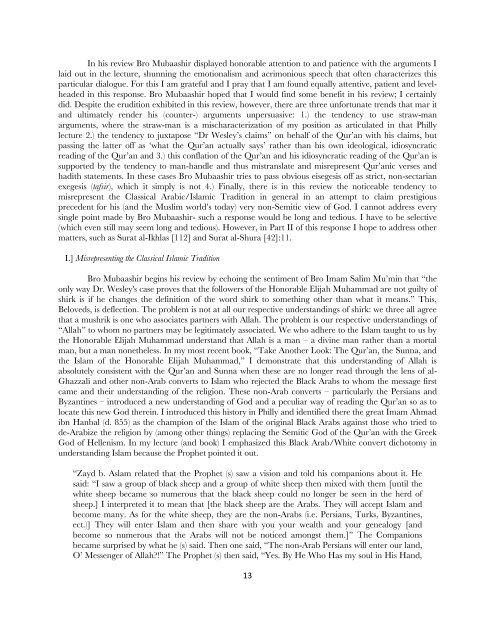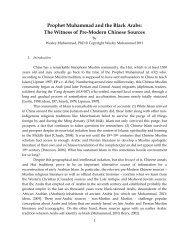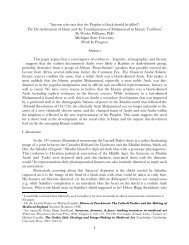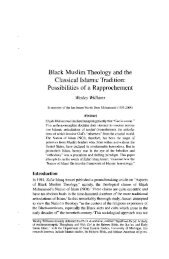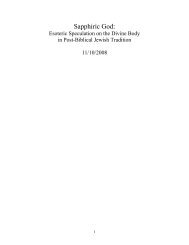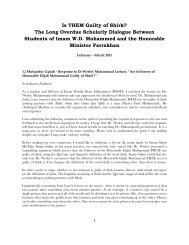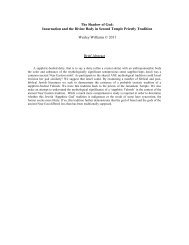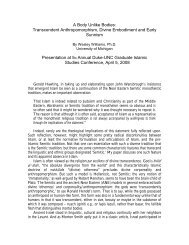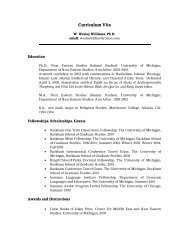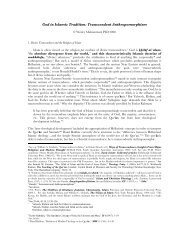Is THEM Guilty of Shirk? - Dr. Wesley Muhammad
Is THEM Guilty of Shirk? - Dr. Wesley Muhammad
Is THEM Guilty of Shirk? - Dr. Wesley Muhammad
You also want an ePaper? Increase the reach of your titles
YUMPU automatically turns print PDFs into web optimized ePapers that Google loves.
In his review Bro Mubaashir displayed honorable attention to and patience with the arguments I<br />
laid out in the lecture, shunning the emotionalism and acrimonious speech that <strong>of</strong>ten characterizes this<br />
particular dialogue. For this I am grateful and I pray that I am found equally attentive, patient and levelheaded<br />
in this response. Bro Mubaashir hoped that I would find some benefit in his review; I certainly<br />
did. Despite the erudition exhibited in this review, however, there are three unfortunate trends that mar it<br />
and ultimately render his (counter-) arguments unpersuasive: 1.) the tendency to use straw-man<br />
arguments, where the straw-man is a mischaracterization <strong>of</strong> my position as articulated in that Philly<br />
lecture 2.) the tendency to juxtapose ―<strong>Dr</strong> <strong>Wesley</strong>‘s claims‖ on behalf <strong>of</strong> the Qur‘an with his claims, but<br />
passing the latter <strong>of</strong>f as ‗what the Qur‘an actually says‘ rather than his own ideological, idiosyncratic<br />
reading <strong>of</strong> the Qur‘an and 3.) this conflation <strong>of</strong> the Qur‘an and his idiosyncratic reading <strong>of</strong> the Qur‘an is<br />
supported by the tendency to man-handle and thus mistranslate and misrepresent Qur‘anic verses and<br />
hadith statements. In these cases Bro Mubaashir tries to pass obvious eisegesis <strong>of</strong>f as strict, non-sectarian<br />
exegesis (tafsir), which it simply is not 4.) Finally, there is in this review the noticeable tendency to<br />
misrepresent the Classical Arabic/<strong>Is</strong>lamic Tradition in general in an attempt to claim prestigious<br />
precedent for his (and the Muslim world‘s today) very non-Semitic view <strong>of</strong> God. I cannot address every<br />
single point made by Bro Mubaashir- such a response would be long and tedious. I have to be selective<br />
(which even still may seem long and tedious). However, in Part II <strong>of</strong> this response I hope to address other<br />
matters, such as Surat al-Ikhlas [112] and Surat al-Shura [42]:11.<br />
I.] Misrepresenting the Classical <strong>Is</strong>lamic Tradition<br />
Bro Mubaashir begins his review by echoing the sentiment <strong>of</strong> Bro Imam Salim Mu‘min that ―the<br />
only way <strong>Dr</strong>. <strong>Wesley</strong>'s case proves that the followers <strong>of</strong> the Honorable Elijah <strong>Muhammad</strong> are not guilty <strong>of</strong><br />
shirk is if he changes the definition <strong>of</strong> the word shirk to something other than what it means.‖ This,<br />
Beloveds, is deflection. The problem is not at all our respective understandings <strong>of</strong> shirk: we three all agree<br />
that a mushrik is one who associates partners with Allah. The problem is our respective understandings <strong>of</strong><br />
―Allah‖ to whom no partners may be legitimately associated. We who adhere to the <strong>Is</strong>lam taught to us by<br />
the Honorable Elijah <strong>Muhammad</strong> understand that Allah is a man – a divine man rather than a mortal<br />
man, but a man nonetheless. In my most recent book, ―Take Another Look: The Qur‘an, the Sunna, and<br />
the <strong>Is</strong>lam <strong>of</strong> the Honorable Elijah <strong>Muhammad</strong>,‖ I demonstrate that this understanding <strong>of</strong> Allah is<br />
absolutely consistent with the Qur‘an and Sunna when these are no longer read through the lens <strong>of</strong> al-<br />
Ghazzali and other non-Arab converts to <strong>Is</strong>lam who rejected the Black Arabs to whom the message first<br />
came and their understanding <strong>of</strong> the religion. These non-Arab converts – particularly the Persians and<br />
Byzantines – introduced a new understanding <strong>of</strong> God and a peculiar way <strong>of</strong> reading the Qur‘an so as to<br />
locate this new God therein. I introduced this history in Philly and identified there the great Imam Ahmad<br />
ibn Hanbal (d. 855) as the champion <strong>of</strong> the <strong>Is</strong>lam <strong>of</strong> the original Black Arabs against those who tried to<br />
de-Arabize the religion by (among other things) replacing the Semitic God <strong>of</strong> the Qur‘an with the Greek<br />
God <strong>of</strong> Hellenism. In my lecture (and book) I emphasized this Black Arab/White convert dichotomy in<br />
understanding <strong>Is</strong>lam because the Prophet pointed it out.<br />
―Zayd b. Aslam related that the Prophet (s) saw a vision and told his companions about it. He<br />
said: ―I saw a group <strong>of</strong> black sheep and a group <strong>of</strong> white sheep then mixed with them [until the<br />
white sheep became so numerous that the black sheep could no longer be seen in the herd <strong>of</strong><br />
sheep.] I interpreted it to mean that [the black sheep are the Arabs. They will accept <strong>Is</strong>lam and<br />
become many. As for the white sheep, they are the non-Arabs (i.e. Persians, Turks, Byzantines,<br />
ect.)] They will enter <strong>Is</strong>lam and then share with you your wealth and your genealogy [and<br />
become so numerous that the Arabs will not be noticed amongst them.]‖ The Companions<br />
became surprised by what he (s) said. Then one said, ―The non-Arab Persians will enter our land,<br />
O‘ Messenger <strong>of</strong> Allah?!‖ The Prophet (s) then said, ―Yes. By He Who Has my soul in His Hand,<br />
13


